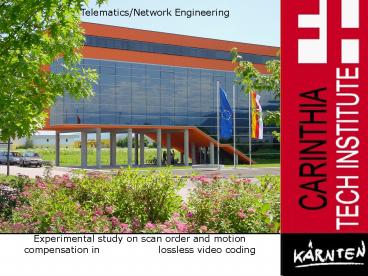PowerPoint-Pr - PowerPoint PPT Presentation
Title:
PowerPoint-Pr
Description:
Experimental study on scan order and motion compensation in lossless video coding ... basis for motion compensated hybrid coding. basis for application of 3D ... – PowerPoint PPT presentation
Number of Views:24
Avg rating:3.0/5.0
Title: PowerPoint-Pr
1
Telematics/Network Engineering
Experimental study on scan order and motion
compensation in lossless video
coding
2
Scan order and motion compensation in lossless
coding
Team
- School of Telematics and Network Engineering
- Carinthia Tech Institute, Austria
- Team of students Stefan A. Kramatsch
- Agnes Gruber, Alexander Krapesch, Stefan
Matschitsch, Thomas Mayerdorfer, - Stefan Miedl, Stefan Moser, Martin Tschinder,
Stefan Zorn-Pauli - Project leader
- Dr. Andreas Uhl
- Head of School
- Dr. Herbert Stögner
3
Presentation Outline
Structure
- Motivation
- Basics
- Realization
- Results
- Conclusion
4
Motivation
Project goals
- Semester Project in Compression Techniques 2
- Alternative way to view videos
- Make data compression more concrete
- Experience usage of programming languages in
- picture processing
5
Basics(1)
Lossless video coding
- Mainly used in medical applications required
by legal - regulation
- JPEG, JPEG-LS, lossless JPEG 2000 on per-frame
basis - Temporal redundancy ignored
- ? no motion compensation
- ? limited compression performance
6
Basics(2)
Classical view of video data
7
Basics(3)
Classical view of video data
- Temporally ordered still images
- Frames are similar
- ? basis for motion compensated hybrid coding
- ? basis for application of 3D video techniques
- Possible to form a 3D block of video data
8
Basics(4)
Different views on the video block
9
Basics(5)
Different views on the video block
- Normal view Horizontal view Vertical view
Frame 40 Frame 112 Frame 112
10
Basics(6)
Scan order
11
Basics(7)
Streams stream compression
- File seen as a stream of gray values
- Written to a .txt file
- File compressors used
- - Arithmetical coder
- - Runlength Encoding (RLE)
- - Huffman Coding
12
Basics(8)
Motion compensation Block matching
- Scene divided into non-overlapping block
regions - Compare blocks (current lt-gt reference frame)
- ? motion vector for each block
- Best match based on mean square error
- ? Stored as prediction
- Current frame prediction residual frame
- to be compressed
- Common for lossy compression
13
Basics(9)
Motion compensation Block matching
- Usage in lossless coding
- Normally temporal based
- ? now spatially
Reference Frame 1 Residual Frame 40
Vertical View
Horizontal View
Frame 112 non BM and BM
Frame 112 non BM and BM
14
Realization(1)
Implementation
- Input all frames of a video (in .pgm format)
- Build the 3D video block
- Cut normally, vertically and horizontally
- With or without blockmatching
- Frame based or stream based computing
- Implemented in c
15
Realization(2)
Implementation of block matching
- Matlab application
- Based on one reference frame
- all remaining residual frames
- Searchwindow 32x32 Pixels
- Blocksize 16x16 Pixels
- Similar Block search based on Root Mean Square
16
Realization(3)
Lossless frame compression
- JPEG 2000 Lossless mode
- Java Implementation JJ2000 (http//jj2000.epfl.ch
) - Standard options except
- Lossless Mode ( lossless on )
- Cancel console output ( verbose off )
17
Realization(4)
Testvideos (Spatial x Temporal resolution)
- Akiyo (176 x 144 x 300) low movement
- Carphone (176 x 144 x 383) high movement
- Claire (176 x 144 x 494) low movement
- Football (720 x 486 x 60) high movement
- Foreman (176 x 144 x 49) high movement
- Grandma (176 x 144 x 871) low movement
- Mobile (720 x 576 x 40) high movement
- Mother and Daughter (176 x 144 x 962) low
movement - Salesman (176 x 144 x 449) low movement
18
Results
Compression Ratio
Low movement High Movement Stream
19
Conclusion(1)
Without Blockmatching
- Improved frame based compression by alternative
views - Exploitation of spatial instead of temporal
redundancies through alternative scan order - Little computational demand compared to BM
- Increased memory demand and coding delay
- Stream compression has little effect
20
Conclusion(2)
With Blockmatching
- The increase of compression ratio does not
justify the usage of BM algorithms in case of
alternative views - Superior results for 1D based compression
algorithms
21
Telematics/Network Engineering
Thank you for your attention!






























